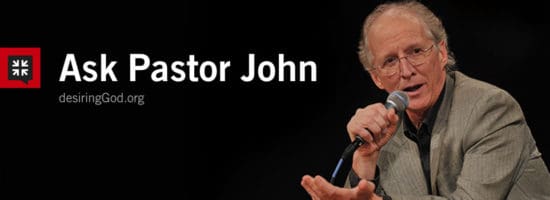
Can a Coin Flip Reveal God’s Will for My Life?
Making a decision with a coin flip glorifies chance. But making a decision from a renewed mind glorifies God.
Today’s question is really good. It arrives from a podcast listener named Hannah. “Dear Pastor John, I have a question about the way it seems that biblical persons, even God-fearing ones, seem to consider casting lots a way to communicate with God. Even the disciples cast lots to decipher God’s will in choosing the twelfth disciple. Is this morally commendable? Does this mean that if I were to ask a question of God, and then cast lots such as rolling dice, that answer counts as an accurate answer to his will? It just feels too easy, wrong, and a bit like witchcraft. But I don’t see any prohibition of it in the New Testament either.”
Never Prohibited
Is it morally right? That is one question. Hannah also asks, “Does this mean that if I were to ask a question of God and then cast lots, or roll dice, that I can count on an accurate answer to his will?” Then she adds, “It just doesn’t feel right. It seems too easy, even wrong.” She even says, “It’s a bit like witchcraft.” But she finishes by saying, “I don’t see any prohibition of it in the New Testament.”
 Hannah, your instincts here are very good. Your biblical assessment is right. There is no prohibition in the Bible against casting lots. That’s true. Just as important, there is no command in the Bible to cast lots.
Hannah, your instincts here are very good. Your biblical assessment is right. There is no prohibition in the Bible against casting lots. That’s true. Just as important, there is no command in the Bible to cast lots.
In the Old Testament, the frequent references to casting lots are almost always regarding the division of the land among the tribes of Israel, which they did by casting lots.
In the New Testament, there are only two mentions of casting lots. One is ugly and the other is God approved. The soldiers, you remember, cast lots for Jesus’s clothes at the foot of the cross (John 19:23–24). That was a horrible, callous moment. Then in Acts 1:21–26, the apostles cast lots between Matthias and Joseph after they had applied all the proper criteria to try to make sure they had two fit candidates to replace Judas as an apostolic witness to the resurrection.
Never Recommended
Now, my answer to your question “If I were to ask a question of God and then roll dice, can I get an accurate answer?” — my answer to this is no. Not only is there no command in the Bible to cast lots; there’s no promise. This is crucial to answer your question. There’s no promise in the Bible that if you do cast lots you will get the right answer. So no, rolling dice is no certain way to find the Lord’s will. You don’t have a promise to that effect.
I think you are right to be surprised and suspicious that certain people, whom you say are otherwise godly, put their stock in casting lots as a means of ordinary guidance in the Christian life. I think that’s crazy. In fact, I think we can say with strong authority and conviction that if someone makes this a pattern in their life, they are out of step with the Bible.
The reason I say that is because, in all the instructions that we have for how to live a Christian life, and how to make decisions and find and do the will of God, in the whole New Testament, this is never mentioned. It’s never, never, never mentioned as part of the way we’re to go about discerning the Lord’s will for our lives.
That would be very strange, wouldn’t it, if it were a good and helpful practice? I’m convinced it is not a good and helpful practice as part of the ordinary way of following Jesus, because what we get instead in the New Testament is a pattern of discernment that is different, very different, than casting lots. Let me give you three examples.
Renew Your Mind
Here’s the most familiar example. Romans 12:2:
“Do not be conformed to this world, but be transformed by the renewal of your mind, that by testing you may discern what is the will of God, what is good and acceptable and perfect.”
So the pervasive pattern of discerning God’s will is this. It’s rooted in a renewal of the mind. This happens as we saturate our minds with God’s word and have our moral senses trained to discern what honors Christ and what doesn’t, and what loves people and what doesn’t: “by the renewal of your mind, that by testing you may discern.”
The basic problem with casting lots is that it does not require any transformation of the mind at all. A chimpanzee can do it. A robot can do it. In itself, there’s nothing spiritual or holy about it. It’s not God’s desire for us to do things that chimpanzees can do.
He wants us to become mature and conformed to his own character so that we see what is beautiful in Christ and in Christ’s way, and then love it, and then choose it. But casting lots doesn’t require that we see the beauty of holiness at all, which means that choosing it doesn’t glorify God.
Do you see this? This is so central and foundational. Casting lots glorifies chance. But if you choose a path of behavior because you see its fitness as a way of glorifying God, and honoring Christ, and helping people, then Christ is honored when you choose it. People are loved when you choose it. That’s what God’s looking for — not robotic ways of discerning a path.
Discerning Love
Here’s another example. It comes from a prayer in Philippians:
“It is my prayer that your love may abound more and more, with knowledge and all discernment, so that you may approve what is excellent, and so be pure and blameless for the day of Christ, filled with the fruit of righteousness that comes through Jesus Christ, to the glory and praise of God” (Philippians 1:9–11).
If we try to be full of the fruits of righteousness by casting lots, we totally miss the point of what righteousness is. It’s the fruit of love, mingled with knowledge and insight, bathed in prayer, and growing up into the glory of God. That’s not what casting lots does.
Children of Light
Here’s one last example:
“For at one time you were darkness, but now you are light in the Lord. Walk as children of light (for the fruit of light is found in all that is good and right and true), and try to discern what is pleasing to the Lord” (Ephesians 5:8–10).
All of that would be canceled out by casting lots as an ordinary part of discernment. When Paul says, “Try to discern what is pleasing to the Lord,” he means, “Go down deep into what it means to be children of the light, and act according to your new nature.”
Glorifying God
Here’s my conclusion. Not only don’t you have any certainty of pleasing God if you roll dice; you put yourself outside the beautiful pattern of New Testament transformation by the Spirit through the word.
Christ wants you to glorify him and his way by the way you make your choices. But lots are mindless things. God is not mindless. You’re not mindless. Sanctification is not mindless. Discernment is not mindless. You have the mind of Christ. You can see the beauty of holiness and glorify the Lord of holiness by choosing it for what it is.
Find other recent and popular Ask Pastor John episodes here.
John Piper (@JohnPiper) is founder and teacher of desiringGod.org and chancellor of Bethlehem College & Seminary. For 33 years, he served as pastor of Bethlehem Baptist Church, Minneapolis, Minnesota. He is author of more than 50 books, including A Peculiar Glory.
(By Desiring God. Discovered by Christian Podcast Central and our community — copyright is owned by the publisher, not Christian Podcast Central, and audio is streamed directly from their servers.)